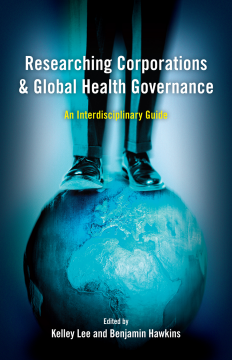
Additional Information
Book Details
Abstract
The profound changes to the world economy since the late twentieth century have been characterised by a growth in the number and size of transnational corporations. In this context, there is now increasing evidence of unprecedented reversals in health indicators among populations around the world. Research in this area has focused on documenting the global health impacts arising from the economic activity of corporations. The challenge for public health researchers is to understand the ways in which corporations are regulated by, and participate in global health governance and implications for health and well-being across the globe. This book is an introductory guide to conducting research on the role of corporations in global health governance from a range of disciplinary perspectives and gives an overview of different approaches, methodologies and data sources.
Also, for case studies providing interdisciplinary empirical analysis of the impact of corporations on global health and global health governance, see the partner volume: http://www.rowmaninternational.com/books/case-studies-on-corporations-and-global-health-governance
No plan to improve global health can succeed without defining appropriate roles for transnational corporations. Researching Corporations and Global Health Governance: An Interdisciplinary Guide provides essential guidance to neophyte and experienced researchers on the methods, data sources and research designs that can provide policy makers with the evidence they need to protect public health from harmful corporate practices.
Nicholas Freudenberg, Distinguished Professor of Public Health, City University of New York, author of Lethal but Legal Corporations, Consumption and Protecting Public Health
Before we can lessen the burden of disease caused by globalized commerce, we must first understand the power behind it. This practical guide offers researchers and policy-makers a much-needed toolkit to build better ways to foster global health.
Cynthia Callard, Executive Director, Physicians for a Smoke-Free Canada
Kelley Lee is Tier 1 Canada Research Chair in Global Health Governance and Professor in the Faculty of Health Sciences, Simon Fraser University.
Dr. Benjamin Hawkins is a Lecturer in Global Health Policy at the London School of Hygiene and Tropical Medicine, teaching global health policy.
This is an essential and highly recommended resource for anyone concerned with the growing influence of corporations in the governance of global health issues. As a clearly written and broad ranging research guide, this book is full of valuable and much needed information for students, scholars and policy makers alike.
Richard Smith, Professor and Dean of Faculty of Public Health and Policy, London School of Hygiene and Tropical Medicine
Table of Contents
| Section Title | Page | Action | Price |
|---|---|---|---|
| Researching Corporations And Global Health\rGovernance | Cover | ||
| Contents | v | ||
| Preface | vii | ||
| Acknowledgements | xi | ||
| List of Acronyms | xiii | ||
| List of Illustrations | xv | ||
| 1 Researching Corporations and Global Health Governance | 1 | ||
| PART I: DISCIPLINARY APPROACHES TO ANALYSING CORPORATIONS | 15 | ||
| 2 Political Science | 17 | ||
| 3 International Political Economy | 29 | ||
| 4 Social Policy | 41 | ||
| 5 Historical Analysis | 51 | ||
| 6 Criminology | 63 | ||
| 7 Anthropology | 75 | ||
| 8 Public Health | 87 | ||
| 9 Development Studies | 101 | ||
| 10 Media Analysis and Corporate Communication | 113 | ||
| PART II: METHODS AND DATA SOURCES FOR ANALYSING CORPORATIONS | 125 | ||
| 11 Interviewing Key Informants from the Corporate Sector | 127 | ||
| 12 The Role of Ethnography in Analysing Corporations | 139 | ||
| 13 Oral History | 151 | ||
| 14 Participation of Corporations in International Organisations | 161 | ||
| 15 Studying the Influence of Corporations on Democratic Processes | 173 | ||
| 16 Analysing Corporate Documents | 189 | ||
| 17 Social Media Research Methods | 203 | ||
| 18 Making Use of Business and Financial Data | 215 | ||
| 19 Using Freedom of Information Requests | 229 | ||
| 20 Tracking Down and Using Grey Literature | 241 | ||
| 21 Legal and Ethical Considerations | 253 | ||
| 22 Developing a Data Management Plan | 265 | ||
| Index | 279 | ||
| About the Contributors | 291 |
